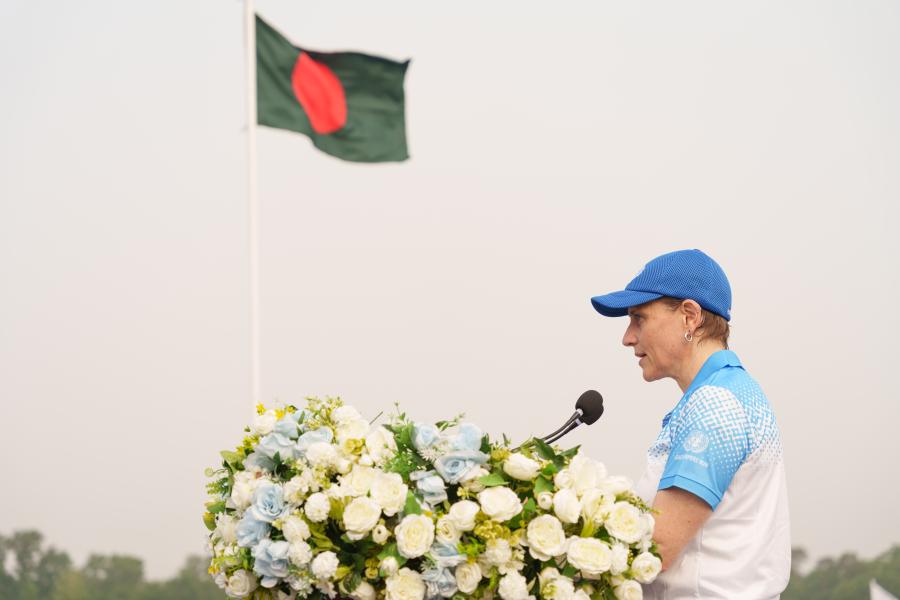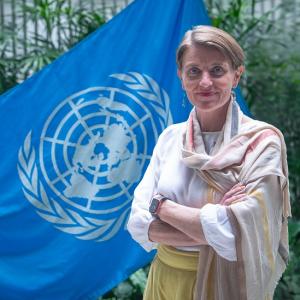Fit for the Future, Building Better Together: Combatting Current Challenges to Peacekeeping
Statement by Ms. Gwyn Lewis, UN Resident Coordinator in Bangladesh for International Day of UN Peacekeepers 29 May 2024 Observation
Honorable Prime Minister, Her Excellency Sheikh Hasina.
Honorable Security Advisor to the Prime Minister – Major General Tarique Ahmed Siddique
Honorable Ministers,
The Chief of Army Staff - General S M Shafiuddin Ahmed,
The Chief of Naval Staff - Admiral M Nazmul Hassan,
The Chief of Air Force Staff - Air Chief Marshal Shaikh Abdul Hannan,
Secretary, Ministry of Foreign Affairs– Ambassador Masud Bin Momen
Principal Staff Officer of the Armed Forces Division - Lieutenant General Mizanur Rahman Shameem
The Inspector General of Police - Chowdhury Abdullah Al Mamun,
Excellencies and esteemed guests.
UN Peacekeepers, former UN Peacekeepers.
And families of the UN Peacekeepers who are present here,
Ladies and Gentlemen.
As'salaamu Alaikum, shubho shokal (good morning in Bangla),
Today, as we gather to commemorate the International Day of Peacekeepers, we do so with profound gratitude and admiration for the valiant men and women who have dedicated themselves to the noble cause of peace and security around the globe.
It is an honor and a privilege to participate in this celebration of the International Day of Peacekeepers.
Since 1948, when military observers were first deployed to oversee the Israel-Arab Armistice Agreement in the Middle East, peacekeepers have been at the forefront of efforts to build bridges and mend the wounds of conflict.
With over two million personnel serving in 71 missions over seven decades, they've guided nations from conflict to peace.
Today, we honor the dedication of over 72,255 peacekeepers from 121 countries in 11 operations worldwide, and remember the 1,374 fallen heroes, who have sacrificed their lives for peace since 1948. Despite escalating global tensions and complex conflicts, our peacekeepers remain steadfast.
As we reflect on the journey of the past seventy-six years, we are reminded not only of the progress, the challenges, we have made but also of the enduring bonds of solidarity that unite us.
This year holds profound significance as we mark fifty years of partnership between the United Nations and Bangladesh— a testament to the enduring bond, united in the pursuit of peace. It’s a partnership built on mutually shared values, enshrined in the UN charter, with full transparency, and mutual accountability.
As we celebrate the 50 years milestone, let us take a moment to recognize and honor the invaluable contribution of Bangladesh to UN Peacekeeping.
Since 1988, Bangladesh has deployed over 194,856 forces globally. Presently, with over 6,092 military and police personnel serving in 13 assignments, Bangladesh stands as one of the largest contributors worldwide.
Distinguished guests,
In October 2000, a pivotal moment unfolded as the UN Security Council recognized and enshrined the indispensable role of women in securing and maintaining peace through Resolution 1325.
Bangladesh proudly played a significant role in the adoption of this landmark resolution on Women, Peace, and Security (WPS).
Highlighting its dedication, Bangladesh took a significant step forward by launching its National Action Plan (NAP) on Women, Peace, and Security in November 2019.
Today there are 493 women peacekeepers deployed in various operations, bringing this to the total of 3,038 female Bangladeshi peacekeepers that have served successfully.
The United Nations looks forward to working with Bangladesh to achieve the target of deploying 18% women as Staff Officers and Military Observers in peacekeeping.
As we acknowledge their contributions and ongoing commitment to peace in conflict-affected areas worldwide, let's also pause to remember the 168 Bangladeshi peacekeepers who lost their lives and the 266 who were injured in their noble pursuit of peace under the UN flag.
My heartfelt condolences go out to their families, friends, and colleagues. Their legacy, like the legacy of all those who lost their life before them, should inspire us all to take action for peace.
Distinguished guests,
The casualties are testimony that the landscape in which UN Peacekeeping operates is more hazardous today than ever before. Geopolitical tensions at the global level reverberate locally. Conflicts are more complex.
This year’s theme - "Fit for the Future, Building Better Together" - is particularly timely. The nature of peacekeeping missions and their attendant threats have become more complex. Peacekeepers are facing hostile armies, non-state armed groups, and criminal gangs.
UN peace operations face new threats from the weaponization of digital tools, with misinformation fueling violence against our personnel and partners. Challenges include protecting civilians, supporting humanitarian assistance, promoting human rights, and securing sustainable peace.
Protecting civilians requires a consistent, transparent, and ethical, approach with clear strategies and standards at all levels, from New York Headquarters to field missions. Peacekeepers are the custodians of the UN charter on the ground, which is a big responsibility, requires highest levels of integrity and professionalism. It requires quality training not only in the technical aspect of the work but also on UN values and principles.
In that respect, I would like to highlight the role of the Bangladesh Institute of Peace Support Operation Training (BIPSOT), which remains a cornerstone of that effort, not only for Bangladeshi peacekeepers but also for peacekeepers from other troop contributing countries. Training to strengthen performance is critical both in terms of improving technical skills and an understanding of UN values.
This is what will ultimately protect our Peacekeepers.
In addition to training, technology, and performance, ensuring adequate working conditions is crucial for guaranteeing the safety and security of peacekeepers. They also require financial support, recognizing the challenging environments in which they serve.
This year's theme, "Fit for the Future, Building Better Together," serves as a reminder that Peacekeeping requires the consent of host governments and the support of regional and international partners to address today's complex peace and security challenges.
Peacekeepers must build strong relationships, based on empathy and mutual respect, with local communities, women and youth, civil society, humanitarian organizations, and governments.
The UN relies on these relationships to resolve tensions, support reconciliation, and build peace.
Let us remember that the UN was established with the UN Charter as its founding document to “save succeeding generations from the scourge of war.” One of its main purposes is to maintain international peace and security, solemnly declaring that preserving the right of peoples to peace and promoting its implementation constitutes a fundamental obligation of each state.
Let me now close by saying, on behalf of the United Nations in Bangladesh, that I pay tribute to the blue helmets - women and men, from Bangladesh - for their service for peace.
Thank you all.

Speech by



